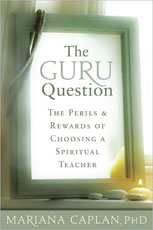This is a revised edition of Do You Need a Guru? by Mariana Caplan (1992). It contains an affirming foreword by Robert Thurman. The author, a psychologist and professor of yogic and transpersonal psychologist, has spent two decades researching and practicing many of the world's great mystical traditions. She is a seasoned spiritual seeker who has traveled four continents to talk to gurus, teachers, healers, shamans, and a variety of other seers. She has many anecdotes to share from this quest. Each chapter contains an interview with experts on the teacher-student relationship including Ram Dass, Jai Uttal, Georg Feuerstein, Vimla Thakar, John Welwood, Krishna Das, Arnaud Desjardins, George Leonard, and others.
Caplan has found a guru who has helped her cope with her special flaws and potentials. She writes: "Yes, I participate in a traditional, committed guru-disciple relationship with a spiritual master who I am fully convinced can, with my conscious, mature, and complete participation, personally guide me to the expression of my highest potential in this lifetime. I am in it for the long haul. In eight years of life with my teacher and his teacher, I have seen and experienced feats of extraordinariness that few people would believe possible, and that even fewer have known. The miracles of matter and spirit are fascinating, but what has grabbed my heart and reorganized my mind are the miracles of love — experiences that have permanently expanded limiting beliefs about the possibility for a human being to participate in a technology that produces love without limitation and service free of all selfish motivation: the literal cellular and alchemical transformation of the heart and the body. The price for this possibility, I am told, is one's life." This is one of the best descriptions we've come across in a long time of the very real potential benefits of a teacher-student relationship.
Caplan keeps the flow going with an insightful chapter on the three necessary qualities in this relationship: basic psychological sanity, conscious relationship to power dynamics, and breaking the rules. For many readers the themes in "Hot Issues" will be the ones they zero in on: spiritual monogamy vs. sleeping around, guru games and crazy wisdom, obedience, and imperfections in the teacher. Caplan is right on target with her call for "conscious discipleship" which includes large doses of attention, maturity, and personal responsibility. This is an illuminating work on a very complex and timely subject. The author brings solid analysis, wit, and years of personal experience to bear on the benefits and challenges of spiritual authority.
